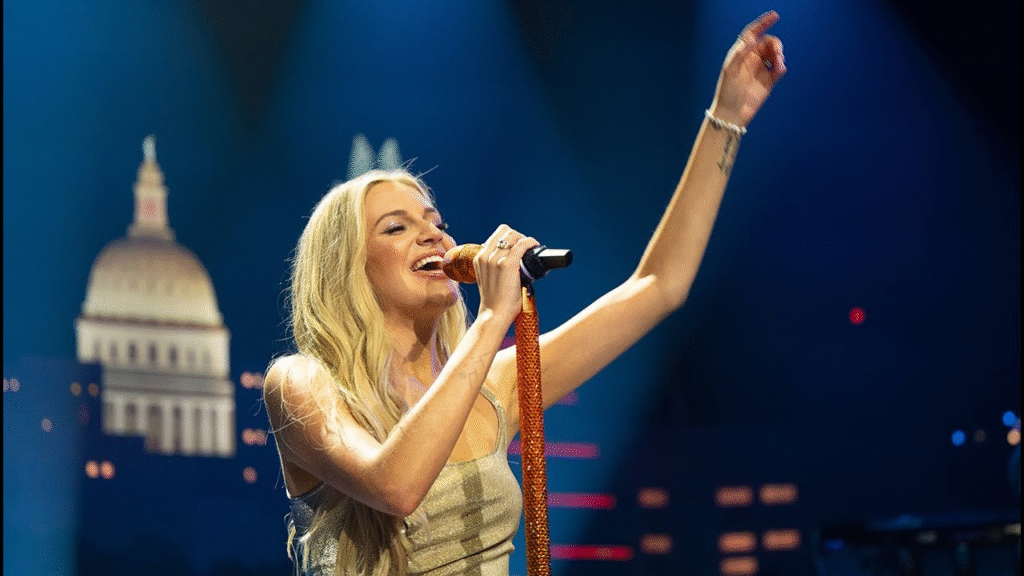Kelsea Ballerini’s haunting new release has become a cultural moment, resonating with women who feel torn between independence and longing for deeper connection. Through vulnerable lyrics, she opens a conversation about loneliness, ambition, timing, and the emotional gaps often ignored in today’s empowerment narratives. Her song isn’t an attack on feminism — it’s a raw confession of what ambition can’t fill.
Kelsea Ballerini’s New Song Is Striking a Deep Emotional Chord

Kelsea Ballerini is no stranger to emotionally honest music, but her latest track has left listeners stunned. The song isn’t loud, dramatic, or splashy — instead, it’s intimate, quiet, and piercingly real. She reflects on watching families, seeing couples with children, and feeling a sadness she didn’t expect.
It’s the kind of confession many people think about but never say out loud. And that is exactly why the song has gone viral across social platforms.
A Song That Feels Like a Private Diary Entry
The song’s emotional impact comes from its simplicity. Instead of metaphors layered with glitter, Kelsea chooses clarity — almost like reading a journal written on a day when you’re too tired to hide behind poetic distance.
She describes sitting alone in public spaces, observing lives that look whole and complete. It creates a contrast between what she has — independence, success, visibility — and what she wonders if she might be missing.
There is no anger. No blame. Just an ache that feels honest.
Why This Song Feels Different From Her Past Work
Kelsea has always been transparent about heartbreak and personal growth, but this track touches a deeper place. It isn’t about romance ending or self-empowerment after loss. It’s about something harder to admit:
What if you made choices you aren’t sure you’re satisfied with?
What if the life you built doesn’t line up with the life you quietly wanted?
What if success doesn’t feel like enough?
These are questions people rarely ask publicly — especially women constantly expected to project confidence and certainty. That’s what sets this song apart.
A Cultural Moment: The Pressure to “Have It All”
For the last decade, cultural messaging has encouraged women to prioritize independence, career achievement, and personal freedom. And many embraced that. But now, some are discovering emotional gaps they never accounted for.
Kelsea’s song taps directly into this generational tension. She’s not saying independence is wrong. She’s not saying feminism failed. What she’s saying is far more nuanced:
Ambition can be empowering, but it can also be lonely.
Freedom can be exhilarating and isolating.
Success doesn’t always silence longing.
And sometimes, the life you thought you wanted at 20 doesn’t match the life you want at 30.
The Emotional Weight Behind the Lyrics
The heart of the song lies in its emotional honesty:
She feels far from the life she sees around her.
She wonders if she waited too long.
She’s proud of her independence but still feels a missing piece.
Many listeners, especially women in their late 20s and 30s, say the song feels like someone finally said the thing they’ve been afraid to admit.
It’s not about choosing the “wrong” path — it’s about confronting the complexity of wanting more than one thing at the same time.
A Reflection Many Fans Feel Deep in Their Bones
Listeners aren’t just praising the song — they’re relating to it intensely. Comments online reveal a widespread emotional reality:
Some feel they delayed motherhood and now fear time slipping away.
Others feel like they traded relationships for career stability.
Many feel exhausted from trying to fit into narratives of empowerment without addressing loneliness.
Kelsea’s song gives permission to feel conflicted. To question. To reflect. To say, “I’m proud of what I’ve built, but I still feel lonely.”
It captures a truth most empowerment slogans never touch.
Understanding the Song’s Loneliness
Kelsea’s loneliness isn’t the cliché heartbreak kind. It’s deeper.
It’s the loneliness that builds quietly over years.
It’s the loneliness that comes from being busy, successful, and constantly in motion.
It’s the loneliness you notice only when you slow down long enough to see the gaps.
It’s the loneliness of wondering if you’ve outgrown your own story.
A Song That Opened a Bigger Conversation
The moment the lyrics circulated online, discussions erupted on multiple fronts:
The emotional cost of ambition
Many noted that women are taught how to succeed, not how to cope with the emotional weight that comes with that success.
The complexity of wanting family
The song addresses an often-taboo topic: the possibility of desiring motherhood after years of saying you didn’t — without shame or apology.
Individual desire versus cultural messaging
Some fans see the song as asking important questions about whether societal expectations have swung too far in one direction.
Again, Kelsea doesn’t attack any ideology — she simply admits how she feels, and that transparency is what’s sparking conversation.
What This Song Says About Kelsea’s Personal Growth
Kelsea has been open about therapy, heartbreak, and rebuilding her life after major transitions. This song feels like a new chapter — not a breakdown, but an awakening.
It shows:
She’s thinking deeply about her future.
She’s honest about feeling uncertain.
She’s willing to share vulnerable truths most celebrities keep hidden.
If anything, it feels like she’s entering a new artistic era — one centered on introspection rather than image.
What This Might Mean for Her Music Going Forward
This track could shape Kelsea’s future songwriting in powerful ways. Its reception proves listeners are craving deeper emotional storytelling — not just empowerment anthems or romantic reflections.
She might explore more themes like:
aging and timing
identity beyond success
longing and life transitions
the emotional cost of ambition
unspoken regrets and hopes
In many ways, this could become one of the defining songs of her career.
Also Read : Baddies USA: Chapter 1 – Everything You Must Know About the Explosive Upcoming
FAQs
Q: What is the main theme of Kelsea Ballerini’s new song?
The song focuses on loneliness, longing, and the emotional conflict that comes from choosing independence while wondering about family, connection, and life’s timing.
Q: Is the song a critique of feminism?
No. It’s not anti-feminist. It’s a personal reflection on how modern empowerment narratives can overlook emotional needs and deeper desires.
Q: Why are so many people relating to her lyrics?
Because the song captures a generational feeling — the quiet realization that success and independence don’t always fill the emotional spaces people expected them to.
Q: Does Kelsea talk about wanting children?
She doesn’t make any vows or declarations. Instead, she explores uncertainty, curiosity, and longing — without forcing a conclusion.
Q: What makes this song different from her past music?
It’s more introspective, more vulnerable, and more philosophical. Instead of focusing on relationships or heartbreak, it explores internal conflict and emotional loneliness.
Join our WhatsApp channel for more updates and information about celebrities and entertainment.

I’m Atul Kumar, founder of Cine Storytellers and an entertainment creator with 5+ years of experience. I cover films, celebrities, music, and OTT content with a focus on accurate, ethical, and engaging storytelling. My goal is to bring readers trustworthy entertainment news that informs, inspires, and goes beyond gossip.
Discover more from Cine Storytellers
Subscribe to get the latest posts sent to your email.
